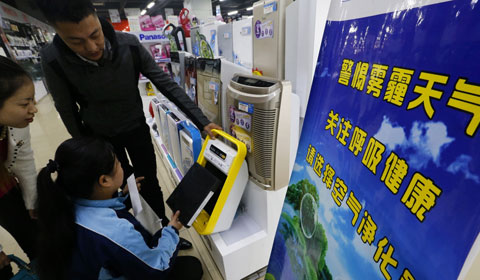Pilot zone offers lifeline for SMEs
Updated: 2013-10-25 02:19
By YU RAN in Shanghai (China Daily)
|
||||||||
Small and medium-sized enterprises in the region of the China (Shanghai) Pilot Free Trade Zone aim to move up the value ladder by taking advantage of new policies and facilities in the pioneer area.
By doing so, they hope to cope with an increasingly competitive global export climate, where low prices are no longer sufficient for success.
Under the framework plan for the FTZ issued by the State Council on Sept 27, manufacturers and traders in Shanghai are encouraged to focus on technology, branding, quality and services to upgrade China's export capability.
Many Chinese SMEs are attempting a corporate transformation that would shift their focus from labor-intensive manufacturing to product design and quality. The formal launch of the FTZ is expected to accelerate that process.
"The quality and design of the products will be our major focus in the next three to five years, because low-quality items made in China are no longer considered that cheap, while branded items will lead to more stable profits in the long term," said Li Jianfeng, general manager of Jiangsu-based Xinshen Group Co Ltd, which makes and exports fine linen products.
Li's company is shifting its marketing emphasis to the domestic front while simultaneously building its own brand and producing more value-added items for Chinese buyers. Xinshen expects sales to rise 20 percent this year.
Li said that he was encouraged by the FTZ's goals and eager to learn whether his company could be involved the huge project.
"The launch will probably bring some positive regional effects to neighboring Jiangsu province, because of the influx of high technology from, and more cooperation with, foreign companies," he said.
Li added that he might register a company in the zone.
Xia Guangyao, chairman of Wenzhou Jialunte Textile & Finery Co Ltd in Zhejiang province, also wants a piece of the action.
As an initial step, he plans to open an office in Pudong, which surrounds the FTZ, by year-end.
"I see the FTZ has already attracted a great number of foreign companies that are launching branches there," said Xia.
He aims to generate half of his company's sales from emerging markets in South America and Africa within the next two years. Total overseas sales should be up 15 percent this year because of these booming markets and rebounding demand in Europe and the United States, he said.
"I am trying to expand to cover a wider range of countries and regions and work with more business partners. I hope that beneficial policies will be issued both within and near the FTZ to help me achieve my goals," he added.
He said he looks forward to the day when a mature financial platform is established in the FTZ that takes advantage of private capital and provides more financial services for companies.
Experts say the zone will be a boon for traders in general.
"It will provide an improved foreign trade environment for exporters and boost demand for traders by attracting more foreign companies," said Huo Jianguo, president of the Chinese Academy of International Trade and Economic Cooperation.
He added that measures related to international trade management will improve the logistics and account-settlement systems in the zone.

 Giant duck to exit after drawing the crowds
Giant duck to exit after drawing the crowds
 Ministry to begin inspecting most heavily polluted regions
Ministry to begin inspecting most heavily polluted regions
 Spy claims stir rebuke to Obama
Spy claims stir rebuke to Obama
 Paint the world a picture
Paint the world a picture
 World's first 1-liter car debuts in Beijing
World's first 1-liter car debuts in Beijing
 Latin American clown convention
Latin American clown convention
 Prince George baptized in London
Prince George baptized in London
 Mass. teacher slain; 14-year-old student charged
Mass. teacher slain; 14-year-old student charged
Most Viewed
Editor's Picks

|

|

|

|

|

|
Today's Top News
US firms urge easier process for investment
China calls for strengthened EU ties
Spy claims stir rebuke to Obama
Traders in Yiwu cashing in on e-commerce shops
PMI heads for 7-month high
Ministry to inspect most heavily polluted regions
Ban to help protect kids from sexual predators
Returnees are 'seed capital' for startups
US Weekly

|

|







